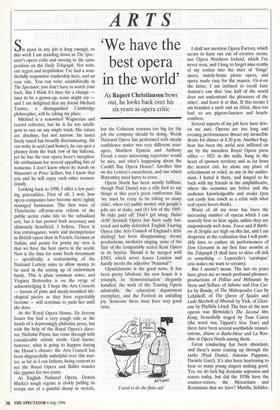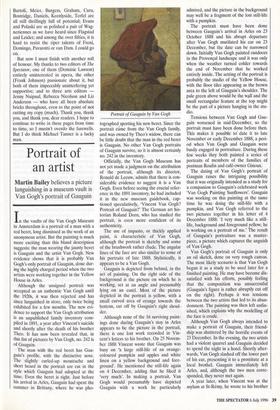ARTS
`We have the best opera in the world'
As Rupert Christiansen bows out, he looks back over his six years as opera critic Six years in any job is long enough, so this week I am standing down as The Spec- tator's opera critic and moving to the same position on the Daily Telegraph. Not with- out regret and trepidation: I've had a won- derfully responsive readership here, and an easy ride. You can write uninhibitedly in The Spectator, you don't have to watch your back. But I think it's time for a change time to be a grown-up, some might say and I am delighted that my friend Michael Tanner, a distinguished Cambridge philosopher, will be taking my place.
Michael is a renowned Wagnerian and record collector, but he is far too intelli- gent to run on any single track. His values are absolute, but not narrow; his tastes finely tuned but broadly discriminating. He can write in acid (and honey), he can spot a phoney from the back row of the balcony, yet he has the true opera lover's inexplica- ble enthusiasm for several appalling bits of nonsense. I don't know where he stands on Massenet or Peter Sellars, but I know that you and he will enjoy each other tremen- dously.
Looking back to 1990, I offer a few part- ing generalities. First of all, I note how opera companies have become more tightly managed businesses. The first wave of Thatcherite off-your-arse reform of the public sector came late to the subsidised arts, but it has proved both necessary and ultimately beneficial, I believe. There is less extravagance, waste and incompetence in British opera than in French, German or Italian, and penny for penny my view is that we have the best opera in the world. Now is the time for some fresh investment — specifically, a restructuring of the National Lottery rules to allow money to be used in the setting up of endowment funds. This is plain common sense, and Virginia Bottomley is on the verge of acknowledging it. I hope the Arts Councils — havens of prim and mealy-mouthed ide- ological pieties as they have regrettably become — will continue to push her until she does.
At the Royal Opera House, Sir Jeremy Isaacs has had a very rough ride at the hands of a depressingly philistine press, but with the help of the Royal Opera's direc- tor, Nicholas Payne, has come through with considerable artistic credit. God knows, however, what is going to happen during the House's closure: the Arts Council has been disgracefully unhelpful over this mat- ter, as far as I can fathom, being content to see the Royal Opera and Ballet wander like gypsies for two years.
At English National Opera, Dennis Marks's tough regime is slowly pulling its troops out of a painful slump in morale, but the Coliseum remains too big for the job the company should be doing. Welsh National Opera has performed with steady confidence under two very different man- agers, Matthew Epstein and Anthony Freud: a more interesting repertoire would be nice, and what's happening about the Cardiff Bay Opera House? Another blot on the Lottery's escutcheon, and one which Bottomley must hurry to erase.
Opera North has been mostly brilliant, though Paul Daniel was a silly fool to say things at this year's press conference like 'we must be crazy to be taking so many risks', when (a) public money and people's jobs are at stake, and (b) few of the 1995- 96 risks paid off. Don't get smug. Habet AM!! Scottish Opera has been sadly bat- tered and nobly defended. English Touring Opera (the Arts Council of England's little darling) has been disappointing: dreary productions, mediocre singing, none of the flair of the comparably scaled Kent Opera in its heyday. Should it be merged with ENO, which never leaves London and hardly merits the adjective 'National'?
Glyndebourne is the good news. It has been pretty fabulous; the new house is a triumph, its 'democratisation' elegantly handled, the work of the Touring Opera admirable, the education department exemplary, and the Festival an unfailing joy. Someone there must have very good taste.
'f used to do the flake ads' I shall not mention Opera Factory, which seems to have run out of creative steam, nor Opera Northern Ireland, which I've never seen, and I long to forget nine-tenths of my sorties into the mire of 'fringe' opera, stately-home picnic opera, and opera made easy for the masses. Vis-a-vis the latter, I am inclined to recall Jane Austen's saw that 'one half of the world does not understand the pleasures of the other', and leave it at that. If this means I am branded a snob and an elitist, then too bad: so are pigeon-fanciers and beach- combers.
Several aspects of my job here have driv- en me nuts. Operas are too long and evening performances thwart my invincible desire for dinner at 8.30 p.m. Another bug- bear has been the awful seat inflicted on me by the merciless Royal Opera press office — H21 in the stalls, bang in the heart of sponsor territory and as far from the nearest exit, let alone any place of refreshment or relief, as any in the audito- rium. I hated it there, and longed to be back with my friends in the amphitheatre, where the acoustics are better and the audience knowledgeable and awake (you can easily lose touch as a critic with what real opera lovers think).
Worst of all my woes has been the increasing number of operas which I can scarcely bear to hear again, unless they are stupendously well done. Tosca and 11 Barbi- ere di Siviglia are high on this list, and I am desperate at the realisation that I will prob- ably have to endure six performances of Don Giovanni in my first four months at the Telegraph (I shall have to skive off sick or something — Leporello's 'catalogue' aria makes me want to scream).
But I mustn't moan. The last six years have given me so much profound pleasure: productions of Pelleas and Melisande by Stein and Sellars, of Salome and Don Car- los by Bondy, of The Makropoulos Case by Lehnhoff, of The Queen of Spades and Lady Macbeth of Mtsensk by Vick, of Glori- ana by Phyllida Lloyd. The best of the new operas was Birtwistle's The Second Mrs Kong, beautifully staged by Tom Cairns (the worst was Tippett's New Year) and there have been several worthwhile resusci- tations, Ariane et Barbe-bleue and La Ron- dine at Opera North among them.
Great conducting has been abundant, and there's more coming up through the ranks (Paul Daniel, Antonio Pappano, Daniele Gatti). It's also been heartening to hear so many young singers making good. Yes, we do lack big dramatic sopranos and tenors today, but did the 1930s have the counter-tenors, the Mozartians and Rossinians that we have? Mattila, Schafer, Bartoli, Meier, Burgess, Graham, Cura, Bostridge, Daniels, Keenlyside, Terfel are all still thrillingly full of potential; Evans and Polaski are as polished a pair of Wag- neriennes as we have heard since Flagstad and Leider; and among the over fifties, it is hard to resist the riper talents of Freni, Domingo, Pavarotti or van Dam. I could go on.
But now I must finish with another roll of honour. My thanks to two editors of The Spectator, one of them (Dominic Lawson) entirely uninterested in opera, the other (Frank Johnson) passionate about it, but both of them impeccably uninterfering yet supportive; and to three arts editors Jenny Naipaul, Rebecca Nicolson and Liz Anderson — who have all been absolute bricks throughout, even to the point of not cutting my copy (much). Thank you, thank you, and thank you, dear readers. I hope to continue to write in these pages from time to time, so I mustn't overdo the farewells. But I do think Michael Tanner is a lucky man.



























































 Previous page
Previous page